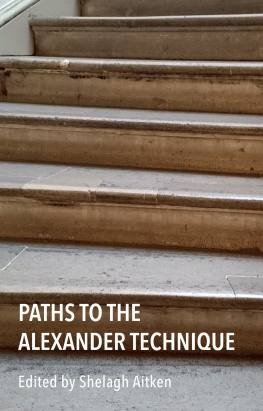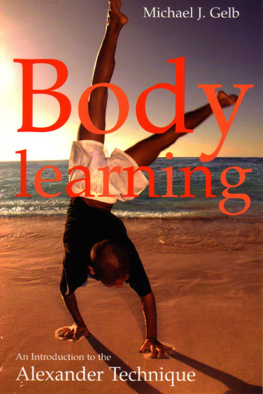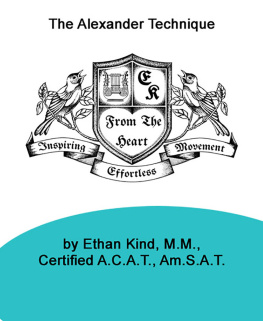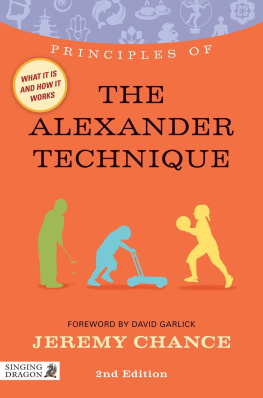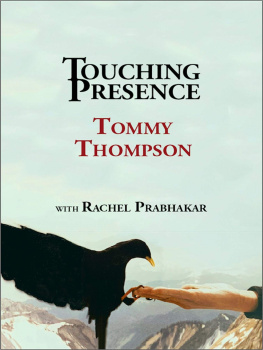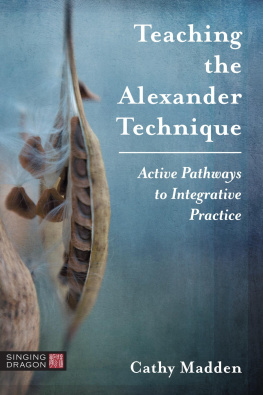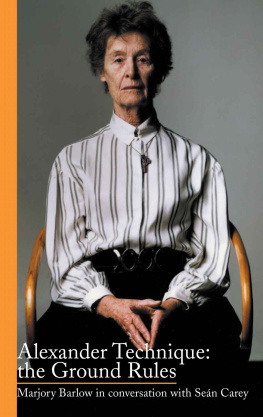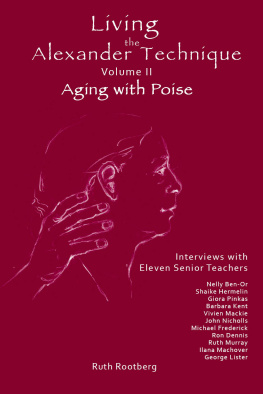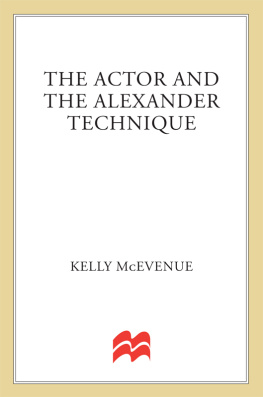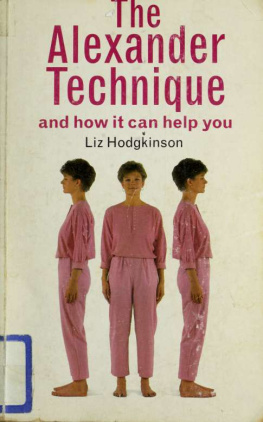PATHS TO THE ALEXANDER TECHNIQUE
Edited by Shelagh Aitken
Paths to the Alexander Technique
First published in 2015 by HITE
Copyright 2015 The F. Matthias Alexander T r ust
All rights rese r ved. No pa r t of this publication may be reproduced, stored in a retrieval system or transmitted in any form or by any means, electronic, mechanical, photocopying, recording or othe r wise, without the prior written permission of the publisher.
A CIP catalogue for this book is available from the British Libra r y.
Printed and bound in UK by Imprint Digital
ISBN: 9780956899767
Contents
Not Doing in Daily Life - Nick Branch
Facing Each Day in My Life - Jacqui Hinton
Musician and Composer - Chris Cousin
British Soldier, Australian Alexander Technique Teacher - Mike McGurgan
Conference Interpreter, Alexander Technique Teacher, Mother - Anna Cooper
Taking Control of a Body and a Life - Peter Ribeaux
The Fundamental Core of My Existence - Clarissa Palmer
My Experience of the Alexander Technique as a Musician - Teresa Tu r ner
The Experience of an Older Person - Dorothy Walker
Council Worker, Speech Therapist - Sean Richardson
Why I Study the Alexander Technique - Dorothy Jerrome
Reflections - Janette Griffin
The Long Road to the Carriage-Driving Trials Championship - Karen Scott-Barrett
Using the Alexander Technique in Liturgy and Teaching - Father Alcuin Schachenmayr
The Twelve Pound Tale - Helen May
My Journey to the Alexander Technique, Surge r y and Beyond - Ma r y R awson
The Way Back from Losing a Voice and a Career - Keith Hawkins
The Freedom to Ascend - Jennet Blake
Never Too Old to Sta r t - Thomas Newton
The Emerging Self - Jane Evans
Fo r ward and Up at Seventy-Five - Roey Burden
Noticing Myself - Christine Green
Getting the Horse to Move - Anonymous
Twisting to the Right While Leaning to the Left - Richard Brennan
Small Surprises When You Dont Expect Them - Anne Landa
Working Through the Contractions - Katie Dixon
The Tree Branch - Anonymous
Discovering the Liberated Breath - Simon Spire
Massage Therapy, Kick Boxing and Pole Dancing - Julia Buccetti
No is Not a Negative - Rosema r y Nott
Gentle but Effective - Melody Hirst
Memories in the Making - Amie Shorey
The Beagler - Anonymous
The Wheel Comes Full Circle - Veronica Pollard
The Real Deal - David Green
Leaving the Feet Behind - Ker r y Downes
The Alexander Technique - My Personal Sto r y - Geraldeen Fitzgerald
A Mindfulness Trail Through the Forest - Cher r y Collins
Round and Round the Garden: A Spiral Learning Journey - Carolyn Nicholls
Destiny Shapes Our Ends - Ann Smith
Acknowledgements
Credit for the idea for this book goes to Jean Clark, Di Maclellan and Ma r y Walker, and to The F. Matthias Alexander T r ust for suppo r ting and financing its production. Thanks are also due to the Society of Teachers of the Alexander Technique (STA T ), who promoted and suppo r ted the idea in Statn e ws, and to the STAT office staff for their generous help.
A big thank you to Claire de Obaldia for writing the Prologue and Epilogue and contributing to the introductions, and to Peter Ribeaux for helping collate and organise the stories and the section introductions. Thanks also to Emily Bates for proofreading the manuscript.
Finally, The F. Matthias Alexander T r ust would like to express a huge thank you to all of the authors who have shared their stories with us. They have had to wait a long time to see them in print and we hope they feel, as we do, the value of bringing the Alexander Technique to a wider audience.
Prologue
The men and women who have agreed to share their stories with us came across the work of F.M. Alexander because they felt they were not functioning to the best of their capacities. The trigger was a crisis or a problem they needed to solve with va r ying degrees of urgency: a life-changing trauma, such as a severe and debilitating pain after a serious accident; a condition or chronic disorder perhaps congenital, perhaps resulting from an illness or, in the case of back pain, from an unfo r tunate movement which suddenly became worse. Less dramatically, it might have been a block of some kind, or a sense of a lifestyle becoming more and more restricted, as Melody Hirst puts it. Or they felt that they were not able to tap into their potential properly, and life was passing them by.
Often the aim is to find a rapid and effective solution, and the Alexander Technique tends to be the last reso r t, after a number of other, more obvious remedies (including various forms of alternative therapy) have been tried to no avail. Eventually by hearsay, through a GP, a friend, an a r ticle in a magazine, a television inte r vi e w, something heard on the radio, a poster, a leaflet, an adult education class, by chancing upon one of Alexanders books, or by being offered a first lesson as a bi r thday present our sto r ytellers, randomly and often sceptically, turn to the Alexander Technique. They feel they have nothing more to lose, and the risks attached to t r ying out the Technique are so low no medicaments, no surge r y and moderate costs, as the author of The Beaglers sto r y says. They discover that the Technique is gentle and non-int r usive.
It is so non-int r usive, in fact, that in the Alexander lesson there will probably be no question of treating the specific complaint at all. Rather than concerning themselves with it the teacher usually chooses to attend to how their n e w pupil coordinates mind and body, or how they use themselves in typical, eve r yday situations.
Rosema r y Notts experience is quite typical in this regard: After a ce r tain number of lessons, I pursued again the question of Would this help my feet as well as my back?I dont see why not, said my teacher. No fu r ther elucidation, no fu r ther discussion about my feet she didnt even look at them... So I began to forget about the feet and they were rarely mentioned again.
Having chanced upon the Alexander Technique indirectly, not to say inadve r tently, for a condition which is also going to be tackled indirectly, what a surprise when something does happen! When (or, you might argue, because) nothing much seems to be happening in the expected sense, a change takes place. The condition which they have been invited to approach indirectly has become manageable, or has mysteriously disappeared.
From overcoming an initial limitation, our narrators find they can not only make the most of the condition they live with, but push their limits and discover abilities, dispositions, skills which they never thought they had, or which they had simply been afraid to t r y out. The improvement of a predominantly physical condition may open up a world of unexpected physical possibilities and conversely, so r ting out an apparently more mental problem may unexpectedly lift other psychological blocks, or simply broaden the mental repe r toire.
In the last reso r t it seems there is nothing the Alexander Technique cannot be successfully applied to: our bike-rider ( Veronica Pollard) gets gradually better at riding her bike, but also gets better at just about eve r ything else; our conference interpreter emphasises the invaluable benefits of using the Technique in the high-pressure environment of conference interpreting, but also remarks that it is just as useful in dealing with ones childs headmistress, walking the Surrey hills, catching a ball or coping with tax return[s]; Dorothy Jerrome finds the Technique in a roundabout way when initially searching for an effective therapy for her husband and comes to value the AT for physical, emotional, aesthetic, philosophical, [and] intellectual reasons.

